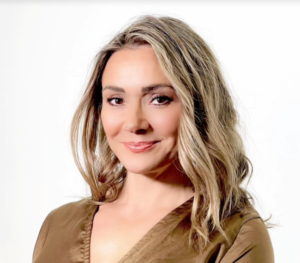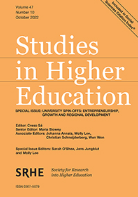Associate Professor Popi Sotiriadou applies her elite sports background and a mindset of excellence to helping others achieve optimal learning and educational outcomes.
 In a novel path to academia, Popi brings her wealth of sports management experiences and a high-performance learning culture to higher education.
In a novel path to academia, Popi brings her wealth of sports management experiences and a high-performance learning culture to higher education.
Popi says:
“Being an elite athlete has transcended into pedagogy, because excellence is about a mindset of being dedicated, challenging yourself, keep learning and ‘growing’, believing in self and processing feedback. Ongoing learning and excellence is as much a part of sports as it is in education.”
Popi was selected to participate in the 1992 Barcelona Olympics representing Greece, but due to an unexpected series of events her team’s place was traded, and this commenced a new journey in sports management and teaching.
Popi came to Australia just before the Sydney Olympics, to complete her PhD on how elite athlete success influences grass roots participation in sports and exercise.
Her current aim is to inspire lifelong learning, through authentic, relevant and engaging assessments and strategies that make people want to learn. Popi says:
“As a student-centred transformational teacher, I believe that, given the right environment, all students can enjoy and ‘own’ their learning. My goal is to offer non-threatening supportive learning environments and apply my expertise to promote deep learning and employ strategies that promote positive changes in the lives of my students and the staff I mentor or coach”.
Popi has spent the past 7 years innovating in the area of assessment, helping to refine the design and practice of Interactive Oral assessments and their application to programs and courses. Interactive Oral (IO) is an authentic assessment approach that involves a genuine, unscripted conversation between an assessor and a student(s) framed around a workplace scenario (Sotiriadou et al., 2020). Following successful trials in business courses from 2016 to 2018, with an internal strategic fund grant from the Griffith Business School awarded in 2019, examined the scalability of IOs.
Since then, this assessment type has expanded into many courses at Griffith and around the world used in small and large cohorts, undergraduate or postgraduate levels, at any discipline, by novice or expert educators. There are now Interactive Oral Communities of Practice in several Universities across Australia and New Zealand and further afield in Ireland, Singapore and the USA, where large numbers of academics meet regularly to apply authentic interactive oral assessment design to their courses and units.
Popi says:
“The authenticity of this kind of assessment had had positive outcomes on student’s perceptions of employability prospects, and more importantly it had great outcomes on academic integrity and preventing academic misconduct.”
Popi with Danielle Logan-Fleming (Learning & Teaching Consultant at the Griffith Business School) have also developed connections with Latin America, including a collaboration with ICESI in Colombia.
Popi says:
“Building on the successful Interactive Oral Community of Practice model, we are now developing an educational strategy that encourages innovative approaches, in co-designing authentic assessments to strengthen education and community bonds between Australia and Latin America. This includes co-hosting international events and inviting leaders in education from Latin American countries to come together to exchange knowledge and advance relationships with each other.”
Another key aspect of this work has been creating a series of videos of interactive oral testimonials from other countries, for different purposes.
On this work, Popi says:
“We created this kind of innovative assessment and people have started using it, which is great, but it’s also important there is some consistency in terminology, in practice and evidence of impact and skill development.”
Popi hopes the creation and use of these videos will provide guidance for academics and teachers to take some risks and experiment in the learning and teaching space.
In addition to this work, Popi is involved with a research project on metacognition and the use of technologies to better understand feedback loops that enhance self-assessment and empower self-directed learning.
Popi says:
“What the research is telling us is that developing meta-cognitive skills is a significant intervention for employability enhancement. Our graduates will have the advantage of reflecting on their performance be it during their probation period, performance appraisal or other contexts.”
By using different technologies to measure the meta-cognitive skills that relate to employability, the research team hopes to ascertain how people’s meta cognitive skills have been developed and their perception of how evolution of those skills can be applied in the context of future employment. This is being trialled in sports management courses.
Popi is inspired by positive feedback that shows these kinds of innovations are having real world impact and changing people lives. Her advice to academics with considerable demands on their personal and professional time, is to “kill as many birds as possible with one stone.”
“It’s helpful to combine interests in teaching with research … and working in partnerships helps augment the outcomes. So, implementing evidence-based developments in assessment for example as an opportunity to innovate, to inform a research project or to apply for a grant, work in partnership with other colleagues who have the same passion and disseminate the results as a way of sharing the new knowledge across the sector. We can reduce pressures on our time by making our work more connected and aligned.”
Read more about Popi’s fascinating work on her Expert’s profile and below.
Interactive oral assessment: an authentic and integral alternative to examination



